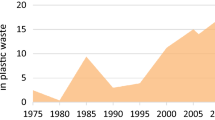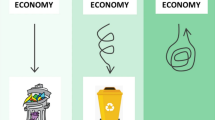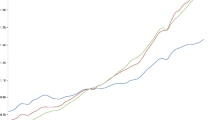Abstract
Nowadays, it is almost impossible to argue about global development without immediately stopping to think about waste; it is claimed that waste materials are correlated with the growth of the population as a consequence of consumption habits. The applied multivariable statistical analysis, both quantitative and qualitative of the BIG DATA of the OECD in the period of 1960–2050 of the World Bank from the decades of 1990–2020, and SCOPUS (1996–2020) using applied multivariate statistics. The results reveal that consumption habits are strongly influenced by access to public services more than by purchasing power, in addition, it was determined that the rate of subscriptions to cellular service is a catalyst for population indicators and ordinary waste middle tight (RO) of 0.96 m3 for person daily, study shows the trace of evolution due to the most significant advance in communication technologies, important findings for the construction of solutions within the concepts of circular economy, sustainable development, social market economy, and social responsibility.





Similar content being viewed by others
Data availability
All data generated or analyzed during this study are included in this published article and its supplementary information files.
References
Aguiar FHO, Barrichello A, Morano RS, Silva DL, Oliveira GM, Seabra VB (2014) Do evaluation of the usability of mobile phones in the Brazilian market: does gender, age, schooling, and family income have any influence? IMED 4(2):144–160
Almeida RN, Pedrotti A, Bitencourt DV, Santos LCP (2013) The problem of municipal solid waste. Sci Interfaces - Health Environ 2(1):25–36
Arvizu JLF, Huacuz JMV (2003) Sanitary filling biogas for electricity production. IIE 3(1):118–123
Bustos CF (2009) The problem of waste alone. Economy 27:121–144
Caballero-Julia D, Vicente MP, Galindo MP (2014) Discussion groups and HJ-BiPlot a new form of textual analysis. Iberian Journal of Information Systems and Technologies, v. E n. 2, p. 19-36. https://doi.org/10.17013/risti.e2.19-35
Carvalho A, Ferreira V, Matos AR (2021) Ontology of the anthropocene: climate crisis, socio-political responses and emerging technologies. Sociol Forum 1(38):5–13. https://doi.org/10.4000/sociologico.9693
Cervera-Quintero J (2021) Internet connectivity in Colombia and its relationship with the sustainable development goals (2015-2020). Sci Air Power 16(1):39–54. https://doi.org/10.18667/cienciaypoderaereo.705
Cheol-Heum P, Chung KJ, Kim TG, Lee JH, Kim IK, Kim YH (2020) Big data statistical analysis of facial fractures in Korea. J Korean Med Sci 35(7):1–12. https://doi.org/10.3346/jkms.2020.35.e57
Costa AC (2021) From inconvenient truth to enough: cosmo anthropocene policies. Electronic. J Philos 18(1):37–49. https://doi.org/10.23925/1809_8428.2021v18i1p37_49
Costa ARS, Silva RCP, Jucá JFT, El-Deir SG (2020) Application of ecological footprint in the management of municipal solid waste through analysis of main components: study of the city of Recife/Brazil. Magazine AIDIS Eng Environ Sci Res Dev Practice 13(2):320–333. https://doi.org/10.22201/iingen.0718378xe.2020.13.2.67115
Dunel MP, Barbosa CFT (2019) Study of the thermal comfort of a housing of social interest (HIS) with ecological brick masonry produced with municipal solid waste tailings in ARACAJU/SE. In: 15 ENCAC 11 ELACAC, p. 1261-1272
Franqueto R, Delponte AA, Franqueto R (2019) Study of the recycling process and the management of municipal solid waste in a municipality of Paraná/Brazil. Environ Sustain Notebook 15(8):24–29
Góes FGB, Santos AST, Campos BL, Silva ACSS, Silva LF, França LCM (2021) Use of IRAMUTEQ software in qualitative research: an experience report. Rev Enferm REUFSM 11(63):1–21. https://doi.org/10.5902/2179769264425
Gutiérrez MRC (2011) The conceptual references of social development. Ixaya Univ J Soc Dev v. n.1:39–55
Hair JF, Anderson RE, Tatham RL, Black WC (2009) Multivariate Analysis, Ed. 5, PRENTICE HALL 814 p
Kahn S, Anjum R, Raza ST, Bazai NA, Ihtisham M (2022) Technologies for municipal solid waste management: current status, challenges, and future perspectives. Chemosphere 288(1). https://doi.org/10.1016/j.chemosphere.2021.132403
Kaur P, Kaur GJ, Routray W, Rahimi J, Nair GR, Singh A (2021) Recent advances in utilization of municipal solid waste for production of bioproducts: a bibliometric analysis. Case Stud Chem Environ Eng, v. 4, n. 100164. https://doi.org/10.1016/j.cscee.2021.100164
Keong CY (2021) Global Environmental Sustainability, Elsevier, 368 p. ISBN 9780128224199,. https://doi.org/10.1016/B978-0-12-822419-9.00001-1
Kiefer S (2021) CaSE: explaining text classifications by fusion of local surrogate explanation models with contextual and semantic knowledge. Inf Fusion 77(1):184–195. https://doi.org/10.1016/j.inffus.2021.07.014
Kjaldgaard L, Cristall N, Gawaziuk JP, Kohja Z, Logsetty S (2021) Predictors of mortality inpatients with necrotizing fasciitis: a literature review and multivariate analysis. Plastic Surgery, p. 1-8. https://doi.org/10.1177/22925503211034830journals.sagepub.com/home/jsg
Kumar S, Kar AK, Ilavarasan PV (2021) Applications of text mining in services management: a systematic literature review. Intl J Inf Manag Data Insights 1(1):1–14. https://doi.org/10.1016/j.jjimei.2021.100008
Kundariya N, Mohanty SS, Varjani S, Ngo HH, Wong JWC, Taherzadeh MJ, Chang JS, Ng HY, Kim SH, Bui ZT (2021) A review on integrated approaches for municipal solid wated for environmental and economical relevance: monitoring tools, technologies, and strategic innovations. Bioresource Technology, v. 342, n. 12598210.1016/j.biotech.2021.125982
Mallarino CU (2004) From the individual to the State: social development and well-being. Universitas Humanistica 31(58):11–25
Maracajá KFB, Pereira LM, Pinheiro IFS (2021) Sciential analysis of over tourism research through iramuteq software. Qualitas, v. 22, n. 2, p. https://doi.org/10.18391/req.v22i2.5704
Martin PC (2011) Economic policy: economic growth, economic development, sustainable development. Intl Rev Econ World Law 3(1):1–12
Mayorga BCP, Banderas FJC, Castro DEH, Ortiz MAS (2021) The rights of nature, the reparation of environmental damage and prevention. Univ Soc Magazine 13(2):276–282
Mendoza RR, Mota MAS (2021) Avaliação monetária dos prejuízos causados por chuvas intensas nas cidades de Belém do Pará, Brasil e Carrillo de Guanacaste, Costa Rica. Ed. 1, EPTEC, 72 p.
Milton SJ, Richard W, Dean J (2021) Anthropogenic impacts and implications for ecological restotation in the Keroo, south Africa. Anthropocene 36(1):1–14. https://doi.org/10.1016/j.ancene.2021.100307
Mura R (2015) From sustainability to sustainability, a model of sustainable development for its implementation in policies and projects. School of Business Administration Magazine, n. 78, p. 4054
Natume RY, Sant-Anna FSP (2017) Electronic waste: a challenge for sustainable development and the new National Solid Waste Policy Law. IN: 3 international workshops Cleaner production initiatives and challenges for a sustainable word, 9 p
Niño FAP (2020) Introducción al análisis clúster: una aplicación en la clasificación de campos petroleros. Ind Univ Santander, 26 p
OECD, Organization for Economic Co-Operation and Development (2021a) Municipal wasted, geration and treatment. Data extracted on 05 Sep 2021 14:36 UTC (GMT) from OECD. Stat https://stats.oecd.org/viewhtml.aspx?datasetcode=MUNWandlang=en
OECD (2021b) Municipal waste (indicator). 10.1787/89d5679a-en Accessed on 05 September 2021
Oliva, M (2014). China and India: path dependency when thinking about sustainable development strategies. 61 f. (Master) International relations and negotiations. University of San Andrés / University of Barcelona.
Páez J (2021) How many kilos of garbage a person generates per year? Alchemy Environmental Solutions, 6 p.
Palmer CG, Fry A, Líbala N, Ralekhetla M, Mtati N, Weaver M, Mtintsilana Z, Scherman PA (2022) Engaging society and building participatory governance in a rural landscape restoration contex. Anthropocene 1(37):1–14. https://doi.org/10.1016/j.ancene.2022.100320
Paynter RA, Featherstone R, Stoeger E, Fiordalisi C, Voisin C, Adam GP (2021) A prospective comparison of evidence synthesis search strategies developed with and without text-mining tools. Journal of Clinical Epidemiology, v.5 n.1, p. 14-59. 10,1016/j.jclinepi.2021.03.013
Perdomo J (2016) Challenges of sustainable development in China for the XXI Century, a multidimensional vision. ResearchGate, 35 p. 10.13140/RG.2.1.4827.4327
Pereira CS, Almeida BLN, Rodrígues MOS, Diogo MLSA, Barros CLS (2020) Identification of environmental impacts caused by the release of solid and liquid waste in the Itapecuru River. Nature Conserv 13(2):58–66
Pestana LOB, Ventura KS (2020) Evaluation of the disposal of solid waste in the urban environment. Case study: ZOEMI-APOC zone of Araraquara/SP. Environ Forum 16(1):114–130
Pierce, C. S. (1974) The science of semiotics. New Vision.
Ratinaud P. 2009 IRAMUTEQ http://www.iramuteq.org/
Ratinaud P, Marchand P (2012) Application of the ALCESTE method to “large” corpora and stability of “lexical worlds”: analysis of the “Cable Gate” with IRaMuTeQ. Proceedings of the 11th International Days of Statistical Analysis of Textual Data, 835-844
Reis FB, Fernandes PRB (2021) The reuse of solid wasted in the circular economy: a case study in the footwear market. Braziliam J Dev 7(5):48456–48470. https://doi.org/10.34117/bjdv7n5-311
Reyes GE (2001) Main theories on economic and social development. Nómadas 1(1):1–23 https://www.redalyc.org/articulo.oa?id=18100408
Reyes-López MM (2021) Vietnan 2020: a year with few successes, many challenges and uncertainty. Asia Pacific Yearbook 1(20):1–24. https://doi.org/10.24201/aap.2021.323
Rodríguez AVG, Contreras LV, Monteverde GG (2020) Living with phone and partner. Uses of the cell phone in high connectivity environments. Iztapalapa J Soc Sci Human 41(89):151–181. https://doi.org/10.28928/ri/892020/aot3/gonzalezav/velazquezl/grijalvag
Romero-Silva R, Leeuw S (2021) Learning from the past to shape the future: a comprehensive text mining analysis of OR/MS reviews. J Omega 100(1):1–26. https://doi.org/10.1016/j.omega.2020.102388
Rosales-Mendoza RM, Mota MAS (2021) Monetary assessment of the damage caused by heavy rains in the cities of Belém do Para Brasil and Carrillo de Guanacaste, Costa Rica. EPTEC, ed. 1, 72 p
SEMARNAT (Secretary of the Environment and Natural Resources) Report about the Environment in Mexico 2015, 498 p. https://apps1.semarnat.gob.mx:8443/dgeia/informe15/tema/cap7.html#tema1
Serrano AS (2020) The historic (re)insurgency of people’s human rights and rights of nature in Latinamerica: a jusmaterlist challenge to the iusnaturalist and positivist ideology of the bourgeoisie. Nullius 2(1):1–14 https://revistas.utm.edu.ec/index.php/revistanillius/article/view/2803
Silva LB, Mello (2020) The legal, social and economic aspects of solid waste management: opportunities and challenges. J Contrib Soc Sci 1(1):1–14 https://www.eumed.net/rev/cccss/2020/06/residuos-solidos.html
Silva S, Ribeiro EAW (2021) The IRAMUTEQ software as a methodological tool for qualitative analysis in research in professional and technological education. Braziliam J Education Technol Soc (BRAJETS) 14(2):275–284. https://doi.org/10.4571/brajets.v14.n22275-584
Sosa MA (2020) Growth and ecology: the case of south Korea. Intl Rev Living Wages 2(3):49–64 http://revistasinvestigacion.lasalle.mx/index.php/OISAD/article/view/2865/2715
Struk M, Boda M (2021) Factors influencing performance in municipal solid waste management – a case study of Czech municipalities. Waste Manag 139(1):227–249. https://doi.org/10.1016/j.wasman.2021.09.22
Takenaka EMM (2020) Urban waste and environmental health: a historical approach in the municipality of Presidente Prudente/SP. Colloquium Socialis 4(2):92–101. https://doi.org/10.5747/cs.2020.v04.n2.s097
Tian M, Pu B, Chen Y, Zhu Z (2019) Consumer’s wasted classification intention in China: an extended theory of planned Behavior model. Sustainability 11(1):1–18. https://doi.org/10.3390/su1146999
Tomic T, Schneider DR (2017) Municipal solid waste system analysis through energy consumption and return approach. J Environ Manag 203(1):973–987. https://doi.org/10.1016/j.envman.2017.06.070
Velásquez RP (2011) The life of consumption or the social life that is consumed: appreciations on the ideal typology of consumerism of Zygmunt Bauman. Political Stud 1(29):115–127
Vyas S, Prajapati P, Shah AV, Varjani S (2022) Municipal solid waste management: dynamics, risk assessment, ecological influence, advancements, constraints and perspectives. Science of the toral Environment, v. 814, n. 152802 10.106/j.scitotenv.2021,152802
Wang M, Yao M, Wang S, Qian H, Zhang P, Wang Y, Sun Y, Wei W (2021) Study of the emissions and spatial distributions of various power-generation technologies in China. J Environ Manag 278(1):111401, ISSN 0301-4797. https://doi.org/10.1016/j.jenvman.2020.111401
World Bank (WB) (2021). Family of World Development Indicators. https://databank.bancomundial.org/source/world-development-indicators#
Zhi-Guo Yu AK., Klemeš JJ, Bokhari A (2021) A state-of-the-art review of greenhouse gas emissions from Indian hydropower reservoirs, Journal of Cleaner Production, 2021, 128806, ISSN 0959-6526. https://doi.org/10.1016/j.jclepro.2021.128806
Acknowledgments
Coordination for the Improvement of Higher Education Personnel (CAPES).
Funding
Coordination for the Improvement of Higher Education Personnel (CAPES)/BRAZIL Process 88882.445450/2019-01
Author information
Authors and Affiliations
Contributions
RR Mendoza, Costa Rica. Teacher, PhDs Environmental Sciences, conception, design, material preparation, data collection, and the first draft of the manuscript. AM Lima, Brazil. Teacher, Dra. Socio-environmental Development, read and approved the final manuscript. MAS Pimentel, Brazil. Teacher, Dra. Geography, read and approved the final manuscript. AN Pontes, Brazil. Teacher, Dr. Sciences in the modality of Physics, State University of Pará, read and approved the final manuscript. E Rocha, Brazil. Teacher, Dr. Meteorology, read and approved the final manuscript. All authors read and approved the final manuscript.
Corresponding author
Ethics declarations
Ethics approval
Not applicable.
Consent to participate
Accept participate in print preview
Consent for publication
Accept
Competing interests
The authors declare no competing interests.
Additional information
Responsible Editor: Philippe Garrigues
Publisher’s note
Springer Nature remains neutral with regard to jurisdictional claims in published maps and institutional affiliations.
Highlights
• The consumerism generates great amounts of waste.
• Comparison in the study period using the complexity of multivariate statistical techniques of quantitative and qualitative data to enrich the results, so multiplex information can converge in a summary product “possible universal good.”
• What global indicator can explain waste generation as a consequence of human development?
Rights and permissions
Springer Nature or its licensor holds exclusive rights to this article under a publishing agreement with the author(s) or other rightsholder(s); author self-archiving of the accepted manuscript version of this article is solely governed by the terms of such publishing agreement and applicable law.
About this article
Cite this article
Mendoza, R.R., de Lima, A.M., da Silva Pimentel, M.A. et al. World development and generation of waste. Environ Sci Pollut Res 30, 14792–14804 (2023). https://doi.org/10.1007/s11356-022-23106-5
Received:
Accepted:
Published:
Issue Date:
DOI: https://doi.org/10.1007/s11356-022-23106-5




